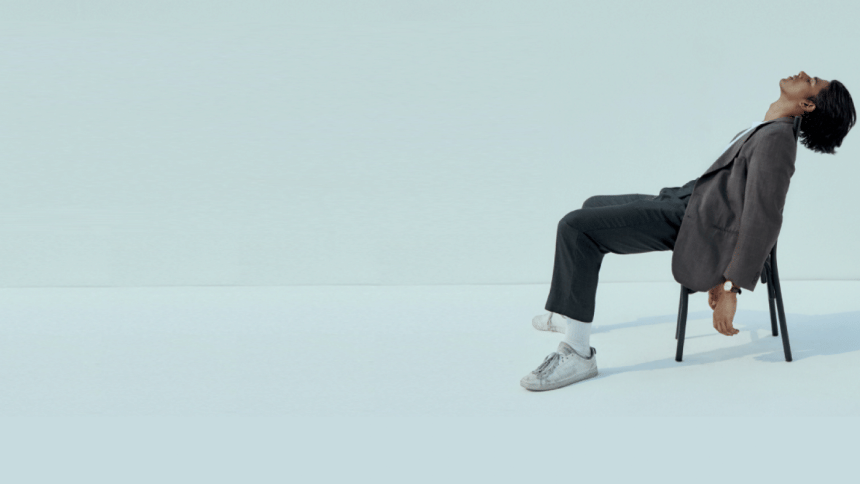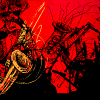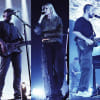Dreams of Dameer

Upon hearing the words, "Hariye jeyo na, amar jaan, amar jaan," I jumped out of my bed to look at the artist, only to fall in love with the music and listen to it on loop for hours to come. It was Dameer.
Dameer Khan, 20, is a singer-songwriter, producer and most importantly, a dreamer and an aspiring changemaker. By combining Western indie rock/pop and jazz with Bengali influences, pairing lo-fi tunes with psychedelic riffs, the exception in Dameer's music is easily noticeable. Lyrics containing odes to positive romanticism, heartbreak and politics, and even mental health, will make you feel as if the words have been taken right out of your mouth and have been perfectly structured in three-to-four minute idiosyncrasies.
Dameer's lyrics are the kind that will carry you to another realm at 4 in the morning, where you will laugh and cry, and if it's raining, you will look outside your window in a different perspective.
With beginnings in Dhaka, finding new inspiration and vibrance in Kuala Lumpur in his mid-teens to recording at Red Bull Studios in Berlin, Dameer offers extraordinary music. SHOUT sat with Dameer for a cup of coffee and conversation over Zoom, and talked over his thoughts on music, life and Bangladesh.
Dameer grew up around music; his father, Pilu Khan, is part of the legendary music band Renaissance. Although his father never forced music onto him, musicians like Bappa Mazumder and Partha Barua regularly visiting the house had a positive impact. Picking up the guitar at a relatively early age, Dameer always went the extra step, simply because he loved doing it. He fell in love seeing his cousin using FL Studio and, with YouTube as his teacher, Dameer started learning and producing genres like hip-hop, EDM and indie.
By 16, Dameer had started sending out his music to different labels. After two consecutive years of dedication, making demos, producing and constant rejection, Majestic Records responded one day. Dameer says, "People are listening, everybody is looking for the next big thing. Send your demos out. Go to the internet, do a bit of homework and you can do it."
From growing up in Dhaka and hanging out with friends at Star Kabab after exams, to moving to Malaysia, Dameer grew both as an individual and as an artist. But he still believes he has unfinished work in his hometown. He misses Dhaka and the city's charm. He misses the sound of the flute player all night beside Pizza Hut in Gulshan. He reminisced about how he misses playing cricket on the rooftop, how much he liked the roadside fuchka and how that will always be a part of him. Although he's set to settle in Canada soon, Dameer can't get over the beauty that Bangladesh has to offer.
"If we, as young people, as artists, are not trying to find something that makes Bangladesh beautiful, we are going to step into an artistic quagmire, a cultural quicksand that we will never get out of. This should be the start of a new movement re-aligning the public image of Bangladesh, because we can do so much more," he shares.
Coming back to music, Dameer has new things coming out. He also has plans to release Bangla music, and in his words, do it justice.

Talking about the backstory of his popular track "Amar Jaan", he says that the song was written about a long distance relationship when he left the country. That relationship was the only source of mental peace to him amidst the cultural shock and new environment he was then in. This song was written quite a while after the end of the relationship which took a lot of love and effort but turned sour. Dameer mentions, in retrospect, the relationship was very special to him and that's why the song resonated with many listeners.
The music video of the song – when contemplating what this song meant to him – Dameer thought it felt like marriage. Dameer converted a 180-minute VHS tape of his parents' wedding into digital and settled on this cheesy, corny, 90s Bangladeshi wedding footage, realising instantly this was what he was looking for. This music video felt like a good shift, after his two previous music videos being professionally produced.
Although Dameer is aware that the chances of succeeding as a musician is terrifyingly low, he tells himself that it's not always about succeeding, but more about loving and exploring the music. Music was always his form of escapism and he is proud of being able to curate his job around it.
He also didn't think he would make it this far. In the future, Dameer wants to expand his art and be something Bangladesh has never seen before. With the experience and knowledge that he is gaining abroad, he wants to help and build new artists in Bangladesh and possibly open up his own record label company one day. He wants to fix the problems he sees in the Bangladeshi music industry and push it in an interesting, ground-breaking, paradigm-shifting way. He wants to embody the change he wants to see and create progressive, innovative music.
Dameer's final message is very clear: If we don't turn this ship around, we are looking forward to a very bleak future. He is, of course, talking about the need for a major change in the current Bangladeshi music scene, from introducing entertainment lawyers, better labels and more organised deals, to building up a new music environment which will include better trap, EDM, dance and other genres.
To him, "The artist has lost all credibility in Bangladesh and we need to put out a message." Dameer is anxious, but at the same time, very hopeful for the future, saying, "We have been juggling through trauma for too long and we are slowly finding an outlet for it and that's why new artists are growing. Let's not build the Bangladesh we want, but the Bangladesh we deserve."

 For all latest news, follow The Daily Star's Google News channel.
For all latest news, follow The Daily Star's Google News channel. 








Comments